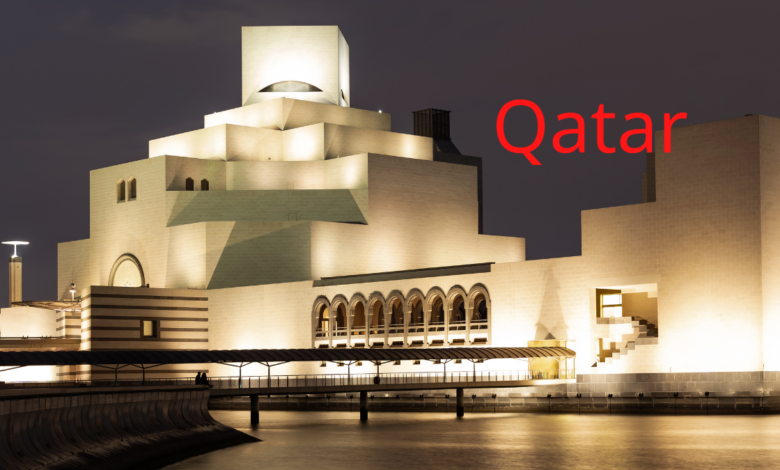
The State of Qatar is a sovereign and independent state in the Middle East, occupying a peninsula that juts into the Arabian Gulf. Since its independence in 1971, Qatar has been ruled by the Al Thani family. The population of Qatar is approximately 2.6 million people, with the majority being Muslim. Islam is the official religion of Qatar, and Sharia Law is a major source of legislation in the country. The climate in Qatar is hot and dry, with temperatures often reaching over 40 degrees Celsius in the summer months. Qatar is home to a number of significant landmarks, including the Museum of Islamic Art, Doha Corniche, and The Pearl-Qatar.
Qatar is a peninsula located in the east of the Arabian Peninsula, north of Saudi Arabia and the United Arab Emirates.
Qatar is a peninsula located in the east of the Arabian Peninsula, north of Saudi Arabia and the United Arab Emirates. Qatar has a small population but its economy is booming due to its large reserves of oil and natural gas. Qatar is also home to some of the best schools and universities in the region.
Qatar is about the size of Croatia or Connecticut.
Qatar is a small country located in the Middle East. It is slightly smaller in area than the US state of Connecticut. Qatar has a population of approximately 2.7 million people. The capital and largest city of Qatar is Doha. Qatar is a member of the Gulf Cooperation Council (GCC). Qatar’s economy is based on oil and gas exports.
Qatar has a population of 2.6 million people, making it one of the most sparsely populated countries in the world.
With a population of only 2.6 million people, Qatar is one of the most sparsely populated countries in the world. Despite its small size, Qatar is home to a large number of expatriates, with over 2 million people living in the country temporarily. The high number of expatriates is due to Qatar’s booming economy, which has made it one of the richest countries in the world. While Qatar may not be as densely populated as some other countries, it still has a large and diverse population that makes it an interesting place to live.
Arabs make up the majority of Qatar\’s population, with Indians and Pakistanis making up the largest minority groups.
Arabs make up the majority of Qatar’s population, with Indians and Pakistanis making up the largest minority groups. Qatar’s population has surged by 13.2% over the last year, official data showed, as the tiny Gulf Arab state recruits thousands of overseas workers to help with its construction boom. The largest population is from India, followed by Nepal, Bangladesh, the Philippines, Egypt, Sri Lanka, and Pakistan. Arabic is the official and locally used language in Qatar.
Islam is the official religion of Qatar and Arabic is the official language.
Islam is the official religion of Qatar, and Arabic is the official language. The constitution guarantees the right to practice any religion, but Islam is the dominant influence in Qatar. Sharia (Islamic law) forms the basis of legislation, according to Qatar’s constitution. The ruling Thani family (Āl Thānī) are Sunni Muslims of Arab origin. In general, the Qatari population is Sunni Muslim with a small Shi’a minority.
-Qatar is a constitutional monarchy headed by Emir Sheikh Tamim bin Hamad Al Thani.
Qatar is a constitutional monarchy headed by Emir Sheikh Tamim bin Hamad Al Thani. The Emir is the head of state and commander-in-chief of the armed forces. He has the power to appoint and remove ministers, and to dissolve the legislature. The Prime Minister is the head of government and is appointed by the Emir.
The economy of Qatar is built on oil and gas revenues, which account for more than 70% of GDP and 85% of government revenues.
The economy of Qatar is built on oil and gas revenues, which account for more than 70% of GDP and 85% of government revenues. Qatar has the third largest gas reserves in the world, and its oil and gas resources are a major source of income for the country. The oil and gas sector accounts for more than 50% of GDP and provides jobs for thousands of Qataris. Qatar’s economy is highly dependent on oil and gas extraction, which makes it vulnerable to fluctuations in global energy prices. However, Qatar has worked to diversify its economy in recent years, and the non-oil and gas sector now accounts for more than 60% of GDP.
Qatar was admitted to the United Nations in 1971 and joined the
The State of Qatar has been an active member of the United Nations since 1971. Qatar’s admission to the UN marked a significant milestone for the country’s foreign policy, and Qatar has since been committed to supporting UN initiatives in various fields. In addition to being an active member of the international organizations of the UN, the State of Qatar places its priorities in respect of international cooperation and coordination with the organization at the forefront.







